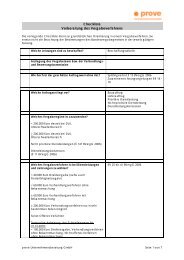Cross-programme evaluation: joint summary - Interact
Cross-programme evaluation: joint summary - Interact
Cross-programme evaluation: joint summary - Interact
You also want an ePaper? Increase the reach of your titles
YUMPU automatically turns print PDFs into web optimized ePapers that Google loves.
INTERACT<br />
Joint <strong>summary</strong> – thematic and operational aspects of cross-border cooperation in Central and South-Eastern Europe<br />
<br />
<br />
<br />
<br />
There is also a need to ensure continuity: <strong>Cross</strong>-border cooperation is not a one-off exercise. It should be<br />
established with a long-term perspective and should be allowed time to grow. <strong>Cross</strong>-border <strong>programme</strong>s are<br />
an important stepping stone in the evolution of cross-border partnerships and should regard themselves as<br />
such. For this reason, <strong>programme</strong>s should also emphasise the sustainability of partnerships and results after<br />
project closure.<br />
How to do the right thing? Territorial Cooperation <strong>programme</strong>s established more complex administration<br />
compared not only to Objective 1 and 2 <strong>programme</strong>s but also to national <strong>programme</strong>s and other EU cooperation<br />
<strong>programme</strong>s, such as the Research Framework Programme. Programmes invest considerable resources<br />
on complying with administrative and legal requirements, many of which were not designed for <strong>programme</strong>s<br />
involving more than one country. There is limited time and resources for supporting projects in the generation<br />
of added value and very limited opportunity to try new and innovative approaches to <strong>programme</strong> and<br />
project management. Obviously this situation is far from ideal, and many <strong>programme</strong>s, stakeholders and<br />
beneficiaries are concerned about it. Especially when it comes to operational aspects, simplification and<br />
proportionality are key words to be kept in mind. It is important to do the right things, not just to do things<br />
right. Therefore, the focus on administrative requirements should not replace the real objectives of the<br />
<strong>programme</strong>. Concern should be placed on reducing the administrative workload of <strong>programme</strong> actors as well<br />
as applicants, through such steps as simplifying procedures and reducing and harmonising administrative requirements.<br />
Regarding content generation, very high levels of complexity can be difficult to handle. There<br />
must be more regular reflection on what is needed in the programming areas and what is the specific role<br />
of territorial cooperation <strong>programme</strong>s in general, as well as in relation to other EU or national <strong>programme</strong>s.<br />
Need for cross-<strong>programme</strong> exchanges and learning: Territorial Cooperation Programmes are willing to<br />
take a broader territorial perspective and are interested in cross-<strong>programme</strong> transfer and learning, but they<br />
also signal their limited resources in this respect. A range of transfer mechanisms is already in use, including<br />
informal exchange with adjacent <strong>programme</strong>s, periodic meetings of actors involved in <strong>programme</strong>s in<br />
trilateral border areas or coordination and exchange between Territorial Cooperation <strong>programme</strong>s at the<br />
national level. Many stakeholders welcome the role of INTERACT in supporting liaison and exchanges among<br />
Territorial Cooperation <strong>programme</strong>s.<br />
Attitude towards macro-regional strategies: Both studies analysed the opinion of <strong>programme</strong>s and projects<br />
on the future macro-regional strategies. The operational study showed that many <strong>programme</strong>s are concerned<br />
about the timing for implementation of upcoming macro-regional strategies – too late for the current<br />
programming period and still too early for the next one. There is also some resistance against tendencies<br />
to use cross-border cooperation <strong>programme</strong>s for co-financing macro-regional strategies, as their financial<br />
resources are rather small and they have a different mission or focus. On the other hand, there are also<br />
many constructive views on macro-regional strategies: they are seen to offer new opportunities and perspectives<br />
for successful ideas on a larger scale, as well as providing the impetus for know-how transfer beyond<br />
the respective <strong>programme</strong> areas. Macro-regional strategies can be seen as an additional framework<br />
that needs to be taken into account, much like National Strategic Reference Frameworks. Like pieces in a<br />
puzzle, cross-border cooperation <strong>programme</strong>s, and their projects, can be seen as synergetic parts of a bigger<br />
picture – contributing to broader topics or strategies. From the point of view of project partners, the<br />
main contribution of cross-border <strong>programme</strong>s is their knowledge of regional needs and people-to-people<br />
integration on the ground. Furthermore, cross-border <strong>programme</strong>s address a broad range of topics involving<br />
different sectors that can be viewed as stimulating factors for an integrative strategy.<br />
- 10 -
















